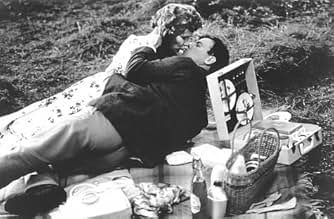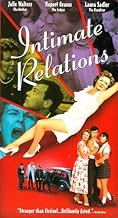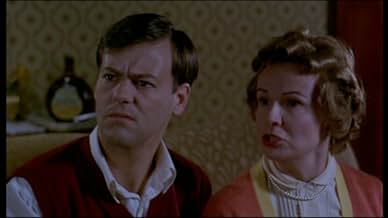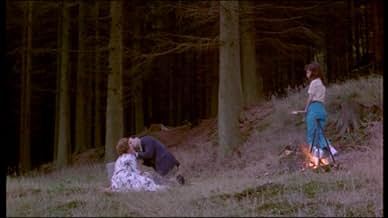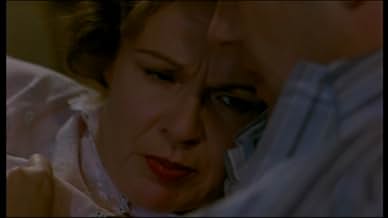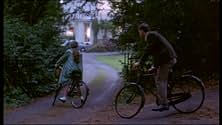The merchant marine visits his estranged brother in an English town. Rebuffed by the brother's wife, he hooks up with a local mother and daughter. Juggling both women proves too much when th... Read allThe merchant marine visits his estranged brother in an English town. Rebuffed by the brother's wife, he hooks up with a local mother and daughter. Juggling both women proves too much when they start arriving together.The merchant marine visits his estranged brother in an English town. Rebuffed by the brother's wife, he hooks up with a local mother and daughter. Juggling both women proves too much when they start arriving together.
- Awards
- 2 wins & 2 nominations total
James Aidan
- George
- (as James Aiden)
- Director
- Writer
- All cast & crew
- Production, box office & more at IMDbPro
6.2873
1
2
3
4
5
6
7
8
9
10
Featured reviews
Intimate Relations
Based on a true story, Harold (Rupert Graves) arrives home after a spell at sea and finds rejection at home from his sister-in-law. Forced to seek lodgings elsewhere, he alights on Marjorie (Julie Walters) who shares a room with her teenage daughter whilst her husband sleeps separately for "medical reasons"! Initially all goes well, they all bond nicely and he settles in as one of the family. The applecart gets a bit upset, though, when Marjorie decides that she's got the hots for her new tenant and after some very timid rebuttals, he soon acquiesces to her demands! The daughter, Joyce (Laura Sadler), meantime, is fully aware of her mother's peccadilloes and threatening to tell her father, insists that she becomes part of their games. Not the sex part, no, but she essentially treats him like an indulgent new father - and one with whom she becomes increasingly infatuated. Needless to say, this situation cannot continue but it's only when he tries to end things that he discovers that his older paramour is quite prepared to make his life a criminal misery with some heinous allegations should he try to escape this web of deceit - before a picnic brings things to a tragic and definitive head! Walters and Graves are both fine here, but they don't gel especially well together and that's quite crucial to the addictive nature of this story. The sex scenes are almost comedic at times and the ease with which this menage-à-trois seems to thrive rather robs the film of much of a sense of jeopardy, or even that they might be doing something wrong and immoral. It does look good but the narrative is a bit flat and disappointing, I found.
very well acted and executed
I thought this film was very well acted especially by the lead actors. Julie Walters gives a brilliant performance, as always, and the story was kept tight and interesting throughout.The ending was very brutal but honestly approached, although of course no-one can be sure exactly what really happened as the two main witnesses couldn't testify.
One of the best movies I've seen
This movie is brilliant, really it is. The fact that it is based on a true story only adds to it and makes it that much better.
Basically, this movie is following Harold Guppy, a man who we want to like but does some pretty despicable things on our road to the ending. He seems like he's had quite a bit of trouble in his life (he lets us know in a discussion with his brother) and he wants to start fresh. This won't be the only time he has such ambitions.
Harold is immediately welcomed into a family who are looking to rent a room. Enter Julie Walters. Although it's a nice, friendly, relationship at first, Harold and Mrs. Beasley's relationship soon turn sexual (though he's in his 30's and she her 50's), where they even result in having sex in bed with Mrs. Beasley's (or as he calls her, Mum's) daughter Joyce.
Their relationship is smooth enough until Harold decides he wants to get out. Mum has this psychological control over him and it isn't healthy. They are now regularly sleeping together (with Joyce still in the bed) and Harold needs to get out of the situation. So he escapes, at least, for a while.
Soon enough Mum has control of him again, saying she'll tell the police that Harold sexually abused Joyce. So here he is again, back in Mum's control.
We are led to believe that Harold really is a good boy, just a weak one. We have compassion for him, as he really needs Mum (it's not as if he ever had one growing up), and he can't escape. But he must.
All the way to the end, we pity our Harold as everything falls apart. And it does fall apart for poor Harold.
This movie is sad in its simplicity and we do feel for many of the characters, Harold's brother and wife, Mum's children, Joyce, Mr. Beasley, the list goes on.
I'd suggest this movie a million times over. The film-maker films each shot so coldly, there never really is any sunshine, and everything seems so grey...it's reminiscent of the relationship Harold and Mum have. Icy.
Julie Walters and Rupert Graves deliver masterly performances, as well as the young girl who is Joyce. Congrats to everyone who worked on this film, it's amazing.
Basically, this movie is following Harold Guppy, a man who we want to like but does some pretty despicable things on our road to the ending. He seems like he's had quite a bit of trouble in his life (he lets us know in a discussion with his brother) and he wants to start fresh. This won't be the only time he has such ambitions.
Harold is immediately welcomed into a family who are looking to rent a room. Enter Julie Walters. Although it's a nice, friendly, relationship at first, Harold and Mrs. Beasley's relationship soon turn sexual (though he's in his 30's and she her 50's), where they even result in having sex in bed with Mrs. Beasley's (or as he calls her, Mum's) daughter Joyce.
Their relationship is smooth enough until Harold decides he wants to get out. Mum has this psychological control over him and it isn't healthy. They are now regularly sleeping together (with Joyce still in the bed) and Harold needs to get out of the situation. So he escapes, at least, for a while.
Soon enough Mum has control of him again, saying she'll tell the police that Harold sexually abused Joyce. So here he is again, back in Mum's control.
We are led to believe that Harold really is a good boy, just a weak one. We have compassion for him, as he really needs Mum (it's not as if he ever had one growing up), and he can't escape. But he must.
All the way to the end, we pity our Harold as everything falls apart. And it does fall apart for poor Harold.
This movie is sad in its simplicity and we do feel for many of the characters, Harold's brother and wife, Mum's children, Joyce, Mr. Beasley, the list goes on.
I'd suggest this movie a million times over. The film-maker films each shot so coldly, there never really is any sunshine, and everything seems so grey...it's reminiscent of the relationship Harold and Mum have. Icy.
Julie Walters and Rupert Graves deliver masterly performances, as well as the young girl who is Joyce. Congrats to everyone who worked on this film, it's amazing.
Definitely Wierd and Dysfunctional Family Fare
If you feel that your family isn't quite right, see this movie and you'll be grateful for what you have. This mother is the mother from Hell, seducing the boarder...a baby-faced ex-reform school lad. But he's an angel compared to her and her pitiful completely wierded out daughter. Guess you would be too if you shared a bed with your mama doing the nasty. Then of course, he refused to play on the night he catered inexplicably to this kids' attempt at blackmail.
Loved the English countryside, despite the fact that it was splashed with gore. It's an interesting diversion from what passes as entertainment today. Wonder what the TRUTH was. Glad that the veteran with one leg at least got Christmas cards from the Veteran's Group over there;;;;that's ALL he ever got.
Loved the English countryside, despite the fact that it was splashed with gore. It's an interesting diversion from what passes as entertainment today. Wonder what the TRUTH was. Glad that the veteran with one leg at least got Christmas cards from the Veteran's Group over there;;;;that's ALL he ever got.
A disturbing drama
Well, I usually like english movies but this is absolutely boring and most disturbing. It is based on a true story, but still this movie is boring. Actors are good. The end is so stupid, that almost it is hard to believe that it is a true story. I would give this movie ** from *****.
Did you know
- TriviaBased on the true story of Albert Goozee, who, on a summer's afternoon in 1956, knifed to death his fifty-three-year-old landlady Lydia Leakey and her fourteen-year-old daughter Norma at a popular New Forest picnic spot. Goozee claimed to have become trapped in an adulterous affair with his middle-aged landlady, and that he had been blackmailed into returning every time he had tried to leave or break off the relationship. Goozee was tried only for the murder of the teenage girl, convicted, and imprisoned for life.
- Quotes
Marjorie Beasley: A lady's reputation is all she has.
- ConnectionsFeatured in The Movie Show: Episode dated 21 September 1997 (1997)
- How long is Intimate Relations?Powered by Alexa
Details
- Release date
- Countries of origin
- Official sites
- Language
- Also known as
- Relaciones íntimas
- Filming locations
- Production companies
- See more company credits at IMDbPro
Box office
- Gross US & Canada
- $53,662
- Opening weekend US & Canada
- $12,918
- Jun 8, 1997
- Gross worldwide
- $53,662
- Runtime
- 1h 45m(105 min)
- Color
- Aspect ratio
- 1.85 : 1
Contribute to this page
Suggest an edit or add missing content

